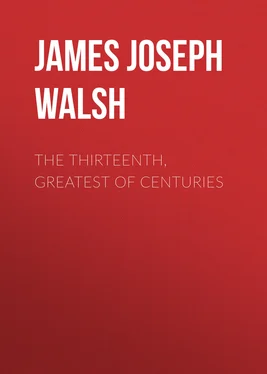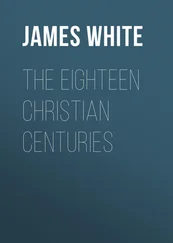James Walsh - The Thirteenth, Greatest of Centuries
Здесь есть возможность читать онлайн «James Walsh - The Thirteenth, Greatest of Centuries» — ознакомительный отрывок электронной книги совершенно бесплатно, а после прочтения отрывка купить полную версию. В некоторых случаях можно слушать аудио, скачать через торрент в формате fb2 и присутствует краткое содержание. Жанр: foreign_prose, История, foreign_edu, foreign_antique, на английском языке. Описание произведения, (предисловие) а так же отзывы посетителей доступны на портале библиотеки ЛибКат.
- Название:The Thirteenth, Greatest of Centuries
- Автор:
- Жанр:
- Год:неизвестен
- ISBN:нет данных
- Рейтинг книги:3 / 5. Голосов: 1
-
Избранное:Добавить в избранное
- Отзывы:
-
Ваша оценка:
- 60
- 1
- 2
- 3
- 4
- 5
The Thirteenth, Greatest of Centuries: краткое содержание, описание и аннотация
Предлагаем к чтению аннотацию, описание, краткое содержание или предисловие (зависит от того, что написал сам автор книги «The Thirteenth, Greatest of Centuries»). Если вы не нашли необходимую информацию о книге — напишите в комментариях, мы постараемся отыскать её.
The Thirteenth, Greatest of Centuries — читать онлайн ознакомительный отрывок
Ниже представлен текст книги, разбитый по страницам. Система сохранения места последней прочитанной страницы, позволяет с удобством читать онлайн бесплатно книгу «The Thirteenth, Greatest of Centuries», без необходимости каждый раз заново искать на чём Вы остановились. Поставьте закладку, и сможете в любой момент перейти на страницу, на которой закончили чтение.
Интервал:
Закладка:
After reading these authoritative opinions, it would be rather difficult to understand the false impressions which have obtained so commonly for the last three centuries with regard to education in the Middle Ages, if we did not realize that history, especially for English-speaking people, has for several centuries been written from a very narrow standpoint and with a very definite purpose. About a century ago the Comte de Maistre said in his Soirées de St. Petersburg, that history for the three hundred years before his time "had been a conspiracy against the truth." Curiously enough the editors of the Cambridge Modern History in their first volume on the Renaissance, re-echoed this sentiment of the French historical writer and philosopher. They even use the very words "history has been a conspiracy against the truth" and proclaim that if we are to get at truth in this generation, we must go behind all the classical historians, and look up contemporary documents and evidence and authorities once more for ourselves. It is the maintenance of a tradition that nothing good could possibly have come out of the Nazareth of the times before the Reformation, that has led to this serious misapprehension of the true position of those extremely important centuries in modern education—the Thirteenth and the Fourteenth.
To those who know even a little of what was accomplished in these centuries, it is supremely amusing to read the childish treatment accorded them and the trivial remarks that even accredited historians of education make with regard to them. Occasionally, however, the feeling of the reader who knows something of the subject is not one of amusement, but far from it. There are times when one cannot help but feel that it is not ignorance, but a deliberate purpose to minimize the importance of these times in culture and education, that is at the basis of some of the utterly mistaken remarks that are made. We shall take occasion only to give one example of this, but that will afford ample evidence of the intolerant spirit that characterizes the work of some even of the supposedly most enlightened historians of education. The quotation will be from Compayré's "History of Pedagogy" which is, I understand, in use in nearly every Normal School in this country and is among the books required in many Normal School examinations.
M. Compayré in an infamous paragraph which bears the title "The Intellectual Feebleness of the Middle Age," furnishes an excellent example of how utterly misunderstood, if not deliberately misrepresented, has been the whole spirit and content and the real progressiveness of education in this wonderful period. After some belittling expressions as to the influence of Christianity on education—expressions utterly unjustified by the facts—he has this to say with regard to the Thirteenth Century, which is all the more surprising because it is the only place where he calls any attention to it. He says:
"In 1291, of all the monks in the convent of St. Gall, there was not one who could read and write. It was so difficult to find notaries public, that acts had to be passed verbally. The barons took pride in their ignorance. Even after the efforts of the Twelfth Century, instruction remained a luxury for the common people; it was the privilege of the ecclesiastics and even they did not carry it very far. The Benedictines confess that the mathematics were studied only for the purpose of calculating the date of Easter."
This whole paragraph of M. Compayré (the rest must be read to be appreciated), whose history of education was considered to be of such value that it was deemed worthy of translation by the President of a State Normal School and that it has been adopted as a work of reference, in some cases of required study, in many of the Normal Schools throughout the country, is a most wonderful concoction of ingredients, all of which are meant to dissolve every possible idea that people might have of the existence of any tincture of education during the Middle Ages. There is only one fact which deeply concerns us because it refers to the Thirteenth Century. M. Compayré says that in 1291 of all the monks of the Convent of Saint Gall there was not one who could read and write. This single fact is meant to sum up the education of the century for the reader. Especially it is meant to show the student of pedagogy how deeply sunk in ignorance were the monks and all the ecclesiastics of this period.
Before attempting to say anything further it may be as well to call attention to the fact that in the original French edition the writer did not say that there was not a single monk. He said, "There was but one monk, who could read and write." Possibly it seemed to the translator to make the story more complete to leave out this one poor monk and perhaps one monk more or less, especially a medieval monk, may not count for very much to modern students of education. There are those of us, however, who consider it too bad to obliterate even a single monk in this crude way and we ask that he shall be put back. There was one who could read and write and carry on the affairs of the monastery. Let us have him at least, by all means.
In the year 1291 when M. Compayré says that there was but a single monk at the monastery of St. Gall who could read and write, he, a professor himself at a French Normal School, must have known very well that there were over twenty thousand students at the University of Paris, almost as many at the University of Bologna, and over five thousand, some authorities say many more than this (Professor Laurie would admit more than ten thousand), at the University of Oxford, though all Christian Europe at this time did not have a population of more than 15,000,000 people. He must have known, too, or be hopelessly ignorant in educational matters, that many of the students at these universities belonged to the Franciscans and Dominicans, and that indeed many of the greatest teachers at the universities were members of these monastic orders. Of this he says nothing, however. All that he says is "Education was the privilege of the ecclesiastics and they did not carry it very far." This is one way of writing a history of education. It is a very effective way of poisoning the wells of information and securing the persistence of the tradition that there was no education until after the beginning of the Sixteenth Century.
Meantime one can scarcely help but admire the ingenuity of deliberate purpose that uses the condition of the monastery of St. Gall to confirm his statement. St. Gall had been founded by Irish monks probably about the beginning of the Eighth Century. It had been for at least three centuries a center of education, civilization and culture, as well as of religion, for the barbarians who had settled in the Swiss country after the trans-migration of nations. The Irish had originally obtained their culture from Christian Missionaries, and now as Christian Missionaries they brought it back to Europe and accomplished their work with wonderful effectiveness. St. Gall was for centuries a lasting monument to their efforts. After the Tenth Century, however, the monastery began to degenerate. It was almost directly in the path of armies which so frequently went down to Italy because of the German interest in the Italian peninsula and the claims of the German emperor. After a time according to tradition, the emperor insisted that certain of the veterans of his army should be received and cared for in their old age at St. Gall. Gradually this feature of the institution became more and more prominent until in the Thirteenth Century it had become little more than a home for old soldiers. In order to live on the benefices of the monastery these men had to submit to ecclesiastical regulations and wear the habit. They were, it is true, a sort of monk, that is, they were willing, for the sake of the peace and ease which it brought, to accept the living thus provided for them and obey to some degree at least the rules of the monastery. It is not surprising that among these there should have been only one who could read and write. The soldiers of the time despised the men of letters and prided themselves on not being able to write. That a historian of pedagogy, however, should take this one fact in order to give students an idea of the depth of ignorance of the Middle Ages, is an exhibition of some qualities in our modern educated men, that one does not like to think of as compatible with the capacity to read and write. It would indeed be better not to be able to read and write than thus to read and write one's own prejudices into history, and above all the history of education.
Читать дальшеИнтервал:
Закладка:
Похожие книги на «The Thirteenth, Greatest of Centuries»
Представляем Вашему вниманию похожие книги на «The Thirteenth, Greatest of Centuries» списком для выбора. Мы отобрали схожую по названию и смыслу литературу в надежде предоставить читателям больше вариантов отыскать новые, интересные, ещё непрочитанные произведения.
Обсуждение, отзывы о книге «The Thirteenth, Greatest of Centuries» и просто собственные мнения читателей. Оставьте ваши комментарии, напишите, что Вы думаете о произведении, его смысле или главных героях. Укажите что конкретно понравилось, а что нет, и почему Вы так считаете.












